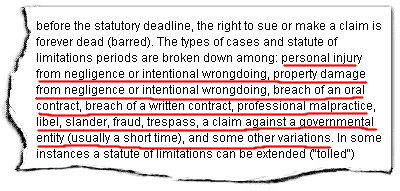|
|
|||||||||||||||||||||||||||||||||||||||||||||||||||||||||||||||||||||||||||||||||||||||||||||||||||||||||||||||||||||||||||||||||||||||||||||||||||||||||||||||||||||||||||||||||||||||||||||||||||||||||||||||||||||||||||||||||||||||||||||||||||||||||||||||||||||||||
Use of the Real Estate FindWiz.info™
is absolutely free, although some state or
county agencies may charge fees for accessing public records. All links indicate
whether online public records searches are available for free, as paid services,
or not available online. All fee based websites have a notation to
indicate that there might be a fee.
|
|||||||||||||||||||||||||||||||||||||||||||||||||||||||||||||||||||||||||||||||||||||||||||||||||||||||||||||||||||||||||||||||||||||||||||||||||||||||||||||||||||||||||||||||||||||||||||||||||||||||||||||||||||||||||||||||||||||||||||||||||||||||||||||||||||||||||
Statute of Limitations in the United StatesThe chart below depicts the Statute of Limitations for Debt in different states of the United States. If you want to know specific details on any account, you can contact your State's Attorney General Office. All numbers in the below chart are the number of YEARS for that state. Oral Contract: You agree to pay money loaned to you by someone, but this contract or agreement is verbal (i.e., no written contract, "handshake agreement"). Remember a verbal contract is legal, if tougher to prove in court. Written Contract: You agree to pay on a loan under the terms written in a document, which you and your debtor have signed. Promissory Note: You agree to pay on a loan via a written contract, just like the written contract. The big difference between a promissory note and a regular written contract is that the scheduled payments and interest on the loan also is spelled out in the promissory note. A mortgage is an example of a promissory note. Open-ended Accounts: These are revolving lines of credit with varying balances. The best example is a credit card account.
What does the Statute of Limitations Mean?The Statute of Limitations is the maximum time limit for a creditor to file a lawsuit in court to claim the outstanding amount against a defaulted debtor. If the lawsuit is not filed within the stated time limit, the creditor will loose the right to claim or sue for it forever. That means the debt collector will no longer have any right to sue for payment of an old debt. If a debt collector still threatens to sue, he can be punished for violating the Fair Debt Collection Practices Act. The SOL time limit is between 3-15 years after the moment a credit contract was signed or the date the debt was first delinquent and never caught up. According to Law.com Dictionary, the cases type and the statute of limitations includes:
The purpose of the Statute of Limitations is to ensure the debtor need not worry about being sued by the creditor for the rest of their life and they get a chance to defend themselves with new evidence. This does not ensure that a creditor will not sue you, however, if they do, you can ask the judge to dismiss the case on the grounds of the debt being time-barred (expired time period). The Statute of Limitations does not hold for certain type of debt. . . such as Federal Student loans, most types of fines, past due child support (depending on the state). |
|||||||||||||||||||||||||||||||||||||||||||||||||||||||||||||||||||||||||||||||||||||||||||||||||||||||||||||||||||||||||||||||||||||||||||||||||||||||||||||||||||||||||||||||||||||||||||||||||||||||||||||||||||||||||||||||||||||||||||||||||||||||||||||||||||||||||
|
For the best tools, technology, training, team coaching and mentoring available anywhere visit StreetSmartInvestor.com Help us improve FindWiz.info™ - Send your suggestions to FindWiz.info@gmail.com
Copyright 2009-2015 Trust Associates - All
Rights Reserved Page Revised on
|
|||||||||||||||||||||||||||||||||||||||||||||||||||||||||||||||||||||||||||||||||||||||||||||||||||||||||||||||||||||||||||||||||||||||||||||||||||||||||||||||||||||||||||||||||||||||||||||||||||||||||||||||||||||||||||||||||||||||||||||||||||||||||||||||||||||||||

